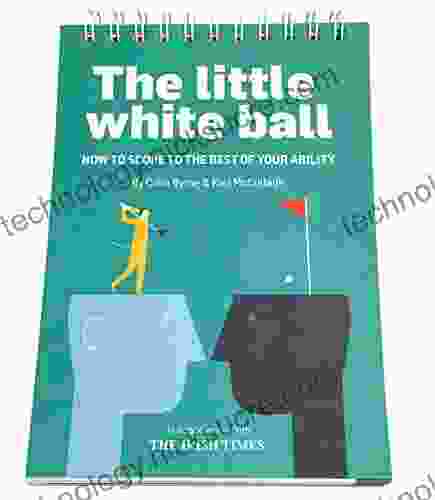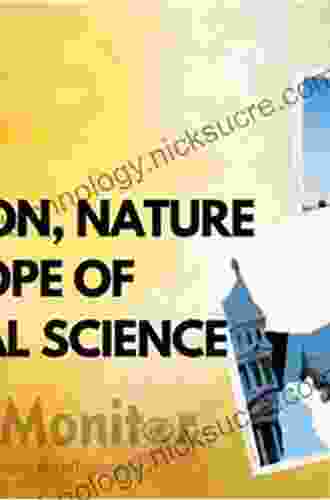Nature Science And Politics 10: An Exploration of the Interplay Between Science, Environment, and Policy

5 out of 5
| Language | : | English |
| File size | : | 16762 KB |
| Text-to-Speech | : | Enabled |
| Screen Reader | : | Supported |
| Enhanced typesetting | : | Enabled |
| Print length | : | 333 pages |
| Lending | : | Enabled |
The relationship between nature science, environment, and politics is a complex and ever-evolving one. On the one hand, science provides us with the knowledge and understanding we need to make informed decisions about how to manage our natural resources and protect our environment. On the other hand, politics often plays a significant role in shaping environmental policies, and can sometimes lead to decisions that are not based on the best available scientific evidence.
In this article, we will explore the interplay between nature science, environment, and politics. We will begin by discussing the importance of scientific evidence in policy-making. We will then examine some of the challenges and opportunities in integrating science into decision-making processes. Finally, we will consider the role of political ideology, public opinion, and stakeholder interests in shaping environmental policies.
The Importance of Scientific Evidence in Policy-Making
Scientific evidence is essential for making informed decisions about how to manage our natural resources and protect our environment. By understanding the complex interactions between humans and the natural world, we can make better decisions about how to use our resources sustainably and minimize our impact on the environment.
For example, scientific evidence has shown that climate change is a real and serious threat to our planet. This evidence has helped to inform政策制定者关于气候变化的必要性,并采取措施减少温室气体排放。
Science can also help us to identify and mitigate the environmental impacts of human activities. For example, scientific research has helped us to develop new technologies to clean up pollution and restore damaged ecosystems.
In short, scientific evidence is essential for making informed decisions about how to manage our natural resources and protect our environment. By understanding the complex interactions between humans and the natural world, we can make better decisions about how to use our resources sustainably and minimize our impact on the environment.
Challenges and Opportunities in Integrating Science into Decision-Making Processes
While scientific evidence is essential for making informed decisions about environmental policy, it is not always easy to integrate science into decision-making processes. There are a number of challenges that can make it difficult to use scientific evidence in policy-making, including:
- Uncertainty and complexity: Scientific evidence is often uncertain and complex, which can make it difficult to use in policy-making. For example, it can be difficult to predict the long-term impacts of climate change or the effects of new technologies on the environment.
- Political interference: Political ideology and special interests can sometimes interfere with the use of scientific evidence in policy-making. For example, some politicians may be reluctant to accept scientific evidence that contradicts their political beliefs or the interests of their constituents.
- Lack of resources: Policy-makers often lack the resources they need to properly evaluate scientific evidence. This can make it difficult to make informed decisions about environmental policy.
Despite these challenges, there are also a number of opportunities for integrating science into decision-making processes. These opportunities include:
- Improved communication: Scientists and policy-makers can work together to improve communication about scientific evidence. This can help to ensure that policy-makers have a clear understanding of the science behind environmental issues.
- Increased transparency: Policy-makers can make it easier for the public to access and understand scientific evidence. This can help to build public support for evidence-based decision-making.
- Greater collaboration: Scientists, policy-makers, and stakeholders can work together to develop and implement environmental policies that are based on the best available scientific evidence.
By overcoming the challenges and seizing the opportunities, we can improve the integration of science into decision-making processes and make better decisions about how to manage our natural resources and protect our environment.
The Role of Political Ideology, Public Opinion, and Stakeholder Interests in Shaping Environmental Policies
In addition to scientific evidence, political ideology, public opinion, and stakeholder interests also play a role in shaping environmental policies. These factors can sometimes lead to decisions that are not based on the best available scientific evidence.
Political ideology can influence how policy-makers view environmental issues and the role of government in protecting the environment. For example, conservative politicians may be more likely to favor free-market solutions to environmental problems, while liberal politicians may be more likely to support government regulation.
Public opinion can also influence environmental policies. Policy-makers are often reluctant to make decisions that are unpopular with the public. This can lead to policies that are not based on the best available scientific evidence.
Stakeholder interests can also play a role in shaping environmental policies. Stakeholders are individuals or groups who have a stake in the outcome of environmental decisions. These stakeholders can include businesses, environmental groups, and local communities.
The interplay between science, politics, and the environment is complex and ever-evolving. By understanding the role of each of these factors, we can make better decisions about how to manage our natural resources and protect our environment.
The relationship between nature science, environment, and politics is a complex and ever-evolving one. On the one hand, science provides us with the knowledge and understanding we need to make informed decisions about how to manage our natural resources and protect our environment. On the other hand, politics often plays a significant role in shaping environmental policies, and can sometimes lead to decisions that are not based on the best available scientific evidence.
By understanding the interplay between science, politics, and the environment, we can make better decisions about how to manage our natural resources and protect our environment.
5 out of 5
| Language | : | English |
| File size | : | 16762 KB |
| Text-to-Speech | : | Enabled |
| Screen Reader | : | Supported |
| Enhanced typesetting | : | Enabled |
| Print length | : | 333 pages |
| Lending | : | Enabled |
Do you want to contribute by writing guest posts on this blog?
Please contact us and send us a resume of previous articles that you have written.
 Fiction
Fiction Non Fiction
Non Fiction Romance
Romance Mystery
Mystery Thriller
Thriller SciFi
SciFi Fantasy
Fantasy Horror
Horror Biography
Biography Selfhelp
Selfhelp Business
Business History
History Classics
Classics Poetry
Poetry Childrens
Childrens Young Adult
Young Adult Educational
Educational Cooking
Cooking Travel
Travel Lifestyle
Lifestyle Spirituality
Spirituality Health
Health Fitness
Fitness Technology
Technology Science
Science Arts
Arts Crafts
Crafts DIY
DIY Gardening
Gardening Petcare
Petcare Nate Silver
Nate Silver Devin Devasquez
Devin Devasquez Elena Zotova
Elena Zotova Dan Purser Md
Dan Purser Md Jenna Gottlieb
Jenna Gottlieb Alda Sigmundsdottir
Alda Sigmundsdottir Robert Spindler
Robert Spindler Jon B Gould
Jon B Gould Fridtjof Nansen
Fridtjof Nansen Dan Gookin
Dan Gookin Hannah V Holmes
Hannah V Holmes Jenny Mackay
Jenny Mackay Arshay Cooper
Arshay Cooper Kingsley Amis
Kingsley Amis Philip Wylie
Philip Wylie Margaret Willson
Margaret Willson Alejandro Portes
Alejandro Portes Josh Bryant
Josh Bryant Erin Bowe
Erin Bowe Celeste Headlee
Celeste Headlee James Suzman
James Suzman Pedro Domingos
Pedro Domingos Alfie Kohn
Alfie Kohn Taylor Harris
Taylor Harris Scott Kelly
Scott Kelly Douglas D Scott
Douglas D Scott Daniel L Everett
Daniel L Everett Ralph Vacchiano
Ralph Vacchiano Joan Wulff
Joan Wulff Sabine Hossenfelder
Sabine Hossenfelder John Kretschmer
John Kretschmer Alistair Moffat
Alistair Moffat Mark Warren
Mark Warren P J Agness
P J Agness K D Hume
K D Hume Ken Schultz
Ken Schultz Nancy Marie Brown
Nancy Marie Brown Paul Volponi
Paul Volponi Leigh Hatts
Leigh Hatts Donnie Eichar
Donnie Eichar Phyllis Good
Phyllis Good Moh Kolli Carnet
Moh Kolli Carnet Soo Kim Abboud
Soo Kim Abboud Teresa Denton
Teresa Denton Caren Cooper
Caren Cooper Janja Lalich
Janja Lalich Steve Flink
Steve Flink Brent Zwerneman
Brent Zwerneman Chukwuma Eleodimuo
Chukwuma Eleodimuo Nikki Nichols
Nikki Nichols R K Gupta
R K Gupta Lonely Planet
Lonely Planet Marilynn Hughes
Marilynn Hughes Marian Dewane
Marian Dewane John Quick
John Quick Cary Nemeroff
Cary Nemeroff Gigi Georges
Gigi Georges Stan Utley
Stan Utley Jase Robertson
Jase Robertson Brad Borkan
Brad Borkan Alberto Villoldo
Alberto Villoldo Paul Sating
Paul Sating George E Vaillant
George E Vaillant Albert S Tarendash
Albert S Tarendash Duncan Butchart
Duncan Butchart Sally Moomaw
Sally Moomaw Jeremy Kubica
Jeremy Kubica Alexander Meyer
Alexander Meyer David Thomas
David Thomas Kathleen Mcmillan
Kathleen Mcmillan Terry Marsh
Terry Marsh Bob Palmer
Bob Palmer Bruce Johnson
Bruce Johnson Jacqueline Tourville
Jacqueline Tourville Alex Pentland
Alex Pentland Alicia Ranoldo
Alicia Ranoldo Emma Hansen
Emma Hansen Winona Guo
Winona Guo Stephan Martin
Stephan Martin Ashton Cartwright
Ashton Cartwright Danielle Tumminio Hansen
Danielle Tumminio Hansen Suzie Sheehy
Suzie Sheehy Alex Riley
Alex Riley Aubrey Sherman
Aubrey Sherman Chuck Norris
Chuck Norris Kevin Gallagher
Kevin Gallagher Richard Shotton
Richard Shotton Thomas Cahill
Thomas Cahill Elizabeth White
Elizabeth White Lisa Silverman
Lisa Silverman Pamela K Lamb
Pamela K Lamb Deirdre Martin
Deirdre Martin Katie Edwards
Katie Edwards Katrina M Adams
Katrina M Adams Ben Malisow
Ben Malisow David Shinar
David Shinar Douglas Doman
Douglas Doman Alex Mars
Alex Mars Sarah Ockwell Smith
Sarah Ockwell Smith Robert Penn
Robert Penn Alex Boese
Alex Boese George Marshall
George Marshall Hiro Ainana
Hiro Ainana Roseanne A Brown
Roseanne A Brown Thomas Sowell
Thomas Sowell Cosmic Kids Publications
Cosmic Kids Publications Victoria Schwab
Victoria Schwab J Richard Hackman
J Richard Hackman Hadley Wickham
Hadley Wickham Kristen Jane Anderson
Kristen Jane Anderson Roy Plotnick
Roy Plotnick C J Brown
C J Brown Robert Dos Remedios
Robert Dos Remedios Lake E High
Lake E High Richard M Foxx
Richard M Foxx Richard D Easton
Richard D Easton Amanda Epperson
Amanda Epperson Darl Kuhn
Darl Kuhn Alex Morgan
Alex Morgan Albert J Raboteau
Albert J Raboteau Duncan Wells
Duncan Wells Charlene L Edge
Charlene L Edge Dan Jacob
Dan Jacob Jennifer Kramer
Jennifer Kramer Tiffany Dionne
Tiffany Dionne Karen Casey
Karen Casey Gabriyell Sarom
Gabriyell Sarom William R Short
William R Short Alex Polyakov
Alex Polyakov Albert Hofmann
Albert Hofmann Michael Digiacomo
Michael Digiacomo Sabbithry Persad Mba
Sabbithry Persad Mba Aman Gupta
Aman Gupta Gary Nicol
Gary Nicol Bertus Engelbrecht
Bertus Engelbrecht Mark Golds
Mark Golds Saxon Andrew
Saxon Andrew James Johonnot
James Johonnot Rebecca Schrag Hershberg
Rebecca Schrag Hershberg Robbie Couch
Robbie Couch Kevin Bales
Kevin Bales Dr Yvonne S Thornton
Dr Yvonne S Thornton Alex Hunter
Alex Hunter Ron Mckeefery
Ron Mckeefery Scott Butler
Scott Butler Derek Lundy
Derek Lundy Catherine Dawson
Catherine Dawson S Kelley Harrell
S Kelley Harrell Jeana Jorgensen
Jeana Jorgensen Wesley Bernardini
Wesley Bernardini Luis Angel Echeverria
Luis Angel Echeverria Julia Wertz
Julia Wertz Lyn Kelley
Lyn Kelley Yannis Detorakis
Yannis Detorakis Peter Brown
Peter Brown Danielle Paige
Danielle Paige L R Trovillion
L R Trovillion Darin Ingels
Darin Ingels John Boyette
John Boyette Kirsten Koza
Kirsten Koza Simon Monk
Simon Monk Kalynn Bayron
Kalynn Bayron David G Kleinbaum
David G Kleinbaum Deborah L Davis
Deborah L Davis Janie B Butts
Janie B Butts Otto Kroeger
Otto Kroeger Laura Morton Rd
Laura Morton Rd Aleister Crowley
Aleister Crowley Jimmy Connors
Jimmy Connors Mary Ellen Hannibal
Mary Ellen Hannibal Alex Banks
Alex Banks Mark Creasy
Mark Creasy Anatoli Boukreev
Anatoli Boukreev Will Hart
Will Hart Alexander Bennett
Alexander Bennett Alexandra Bracken
Alexandra Bracken Ben Ainslie
Ben Ainslie Dennis R Helsel
Dennis R Helsel Jon Krakauer
Jon Krakauer Lynn Alley
Lynn Alley Mauricio Fau
Mauricio Fau Amy Newmark
Amy Newmark Laura Pavlov
Laura Pavlov Tetsu Kariya
Tetsu Kariya Alex Bezzerides
Alex Bezzerides Alan Lightman
Alan Lightman Dipika Mukherjee
Dipika Mukherjee Laura Eckert
Laura Eckert Michele Filgate
Michele Filgate Holly Black
Holly Black Stephanie Ermenegild
Stephanie Ermenegild Lisa Manterfield
Lisa Manterfield Kristin Gambaccini
Kristin Gambaccini Peter Collier
Peter Collier Alexander Boxer
Alexander Boxer Itzhak Bentov
Itzhak Bentov Keith H Basso
Keith H Basso Alexander Ferrauti
Alexander Ferrauti Patrick Taylor
Patrick Taylor Upgraded Brain
Upgraded Brain Scott Fratcher
Scott Fratcher Nancy Silverton
Nancy Silverton Alex Hibbert
Alex Hibbert Rebecca Wilson
Rebecca Wilson Stanley Cohen
Stanley Cohen Michael Clary
Michael Clary Pekka Louhiala
Pekka Louhiala Michael Steven
Michael Steven Alexa Nicole Cucchiara
Alexa Nicole Cucchiara Christie Cognevich
Christie Cognevich C C Hunter
C C Hunter Willard A Palmer
Willard A Palmer Sally Huss
Sally Huss Chanice Lee
Chanice Lee Alex Reinhart
Alex Reinhart Thomas Huhti
Thomas Huhti Mine Dogucu
Mine Dogucu Alex J Gutman
Alex J Gutman Peter J Feibelman
Peter J Feibelman Jennifer Estep
Jennifer Estep David L Demets
David L Demets Gary Coleman
Gary Coleman Aaron Reynolds
Aaron Reynolds Sheryl Buckland
Sheryl Buckland Eli Burakian
Eli Burakian Alex Bellos
Alex Bellos Kortney Keisel
Kortney Keisel Tracy Brown Collins
Tracy Brown Collins Alexander Clarke
Alexander Clarke Alfred P Rovai
Alfred P Rovai Raj Kumar
Raj Kumar Sophie David
Sophie David Richard Ronald
Richard Ronald Eric Mason
Eric Mason Don Bendell
Don Bendell Daniel Shapiro
Daniel Shapiro Hannah Arendt
Hannah Arendt Kinsey Phifer
Kinsey Phifer Glenn Rivers
Glenn Rivers Brian Beffort
Brian Beffort Stephon Alexander
Stephon Alexander Molly Knox Ostertag
Molly Knox Ostertag Julian B Barbour
Julian B Barbour Linda White
Linda White Stephen L Sass
Stephen L Sass Sareen S Gropper
Sareen S Gropper Yang Erche Namu
Yang Erche Namu Howard Carter
Howard Carter Stephen K Hayes
Stephen K Hayes Olivier Doleuze
Olivier Doleuze Denny Matthews
Denny Matthews David Borgenicht
David Borgenicht Kyle Rohrig
Kyle Rohrig G Blake Meike
G Blake Meike Olivia Wildenstein
Olivia Wildenstein Anne Dachel
Anne Dachel Alexander Mccall Smith
Alexander Mccall Smith David N Schwartz
David N Schwartz Mark Sisson
Mark Sisson Michael Sandler
Michael Sandler Stormie Omartian
Stormie Omartian Alexa Whitewolf
Alexa Whitewolf John Stage
John Stage David Farrier
David Farrier Kieran Mccarthy
Kieran Mccarthy Peter Matthiessen
Peter Matthiessen Q S Khan
Q S Khan Aaron Robinet
Aaron Robinet Vimla L Patel
Vimla L Patel David N Myers
David N Myers Janine Marsh
Janine Marsh Austin Murphy
Austin Murphy Alex J Packer
Alex J Packer Jacob Sannox
Jacob Sannox Jim Davidson
Jim Davidson Carla Naumburg
Carla Naumburg Henrik Beyer
Henrik Beyer Daniel Pautrat
Daniel Pautrat Robert L Wolke
Robert L Wolke Alex Zimmerman
Alex Zimmerman Christina Riggs
Christina Riggs Scott Turansky
Scott Turansky Pittacus Lore
Pittacus Lore Steve Warner
Steve Warner Earl Swift
Earl Swift Brigid Kemmerer
Brigid Kemmerer Philip Ball
Philip Ball Bill Haggerty
Bill Haggerty Georgiann Davis
Georgiann Davis Amber Lia
Amber Lia Genese Marie Sodikoff
Genese Marie Sodikoff Derrick Niederman
Derrick Niederman Audra Fordin
Audra Fordin Todd Denault
Todd Denault Joe Nobody
Joe Nobody Ruth Minsky Sender
Ruth Minsky Sender Gabriel Levy
Gabriel Levy Jules Wake
Jules Wake Rajesh K Naz
Rajesh K Naz Oluwaseun Ajayi
Oluwaseun Ajayi Albert Ellis
Albert Ellis Beverleigh H Piepers
Beverleigh H Piepers Daniel Defoe
Daniel Defoe Theodore X O Connell
Theodore X O Connell Mark Reed
Mark Reed Vasti Torres
Vasti Torres Shannon Jett
Shannon Jett Peter Maguire
Peter Maguire Tim Moore
Tim Moore Greg Michaelson
Greg Michaelson Harold Klemp
Harold Klemp Conn Iggulden
Conn Iggulden Wallace Wang
Wallace Wang Rough Guides
Rough Guides Heather Dale
Heather Dale Paul Trammell
Paul Trammell Matt Johanson
Matt Johanson Robertson Tait
Robertson Tait Albert Marrin
Albert Marrin Rachael Ray
Rachael Ray Jeff Galloway
Jeff Galloway Jerry C Zee
Jerry C Zee Milan Yerkovich
Milan Yerkovich River
River Tim Cahill
Tim Cahill Thomas Jaden
Thomas Jaden Matthew Johnson
Matthew Johnson Peter Galison
Peter Galison Alessio Mangoni
Alessio Mangoni Anne Bogel
Anne Bogel Elon Vidal
Elon Vidal Richard Cole
Richard Cole George Ehrenhaft
George Ehrenhaft Andrew Stellman
Andrew Stellman Catherine Crier
Catherine Crier Diana L Paxson
Diana L Paxson Victoria Wilson
Victoria Wilson Chella Man
Chella Man Phil Keith
Phil Keith Alex Harris
Alex Harris Jennifer Boyle
Jennifer Boyle Ari Mennander
Ari Mennander Steve Helling
Steve Helling Aleksandr Anufriyev
Aleksandr Anufriyev Cecil B Hartley
Cecil B Hartley Gail M Nelson
Gail M Nelson Alberta Hawse
Alberta Hawse Alex Johnson
Alex Johnson Sky Marsen
Sky Marsen Celia Hodent
Celia Hodent Elissa Wall
Elissa Wall Albert Rutherford
Albert Rutherford Fretta Reitzes
Fretta Reitzes Martha Sears
Martha Sears Patrick F Mcmanus
Patrick F Mcmanus John Burroughs
John Burroughs Andrew Zerling
Andrew Zerling Scott Whitlock
Scott Whitlock Russ Unger
Russ Unger Namita Prasad
Namita Prasad Hal Higdon
Hal Higdon David Leadbetter
David Leadbetter Alex Gillis
Alex Gillis John Thorne
John Thorne Anna Post
Anna Post Howard Schor
Howard Schor Travis Eliot
Travis Eliot Margaret Rooke
Margaret Rooke Graham Hancock
Graham Hancock Michael Terry
Michael Terry Donald D Hoffman
Donald D Hoffman Alex Itsios
Alex Itsios Alex Light
Alex Light Barbara Ehrenreich
Barbara Ehrenreich Ernest Hemingway
Ernest Hemingway Michele Gelfand
Michele Gelfand Loriann Oberlin
Loriann Oberlin Jennet Conant
Jennet Conant Alex Wolf
Alex Wolf Brent Herrick
Brent Herrick Dr Rebecca Harwin
Dr Rebecca Harwin Suzanne Collins
Suzanne Collins Stephen Wilbers
Stephen Wilbers Pascal Boyer
Pascal Boyer J C Herz
J C Herz Titania Hardie
Titania Hardie Lara S Ormiston
Lara S Ormiston Game Spark
Game Spark Angelo Tropea
Angelo Tropea Phil Hanrahan
Phil Hanrahan Arieh Ben Naim
Arieh Ben Naim Phil Jarratt
Phil Jarratt Eric Enge
Eric Enge Meredith Atwood
Meredith Atwood Megan Carle
Megan Carle Evan F Moore
Evan F Moore Diana Hopkins
Diana Hopkins Ellen Snortland
Ellen Snortland Ernest T Stringer
Ernest T Stringer Steve Bechtel
Steve Bechtel Alex Guarnaschelli
Alex Guarnaschelli Suzanna Mcgee
Suzanna Mcgee Sarah Franklin
Sarah Franklin Kent David Kelly
Kent David Kelly Alexander Mackenzie
Alexander Mackenzie Nate Orlowek
Nate Orlowek Walter Gretzky
Walter Gretzky Katherine Leigh
Katherine Leigh Kevin Mcaleer
Kevin Mcaleer F T Lukens
F T Lukens Eric R Kandel
Eric R Kandel Saunders Mac Lane
Saunders Mac Lane Alexander Jones
Alexander Jones Robert Benson
Robert Benson Tony Roig
Tony Roig Garth Nix
Garth Nix Victor Davis Hanson
Victor Davis Hanson Jennifer Van Allen
Jennifer Van Allen Mary Lynne Fernandez
Mary Lynne Fernandez Alessandro Valerani
Alessandro Valerani Fataniss Store
Fataniss Store Gordon Feinberg
Gordon Feinberg Qaiser Feroze
Qaiser Feroze Patrick Alan Danaher
Patrick Alan Danaher Sam Jalloh
Sam Jalloh Jim Hynes
Jim Hynes Robert W Winters
Robert W Winters David J Chalmers
David J Chalmers Brett Cohen
Brett Cohen Jennifer Cohen Harper
Jennifer Cohen Harper Martin Baldridge
Martin Baldridge Scott L Smith
Scott L Smith Phil Pierce
Phil Pierce Sara Shepard
Sara Shepard Geza Vermes
Geza Vermes L Michele Issel
L Michele Issel Gordon Rugg
Gordon Rugg Michael Thompson
Michael Thompson Gf Denehy
Gf Denehy Vanessa Van Edwards
Vanessa Van Edwards W C Mcrae
W C Mcrae Leonhard Euler
Leonhard Euler Peter Ross
Peter Ross Jerry C Whitaker
Jerry C Whitaker Sarah Lynne Bowman
Sarah Lynne Bowman Larry Pardey
Larry Pardey Zach Davis
Zach Davis Albert W A Schmid
Albert W A Schmid Eric Zandona
Eric Zandona Fiaz Rafiq
Fiaz Rafiq Alex Wade
Alex Wade Morgan Lyle
Morgan Lyle Judy Dutton
Judy Dutton Marvin Harris
Marvin Harris Stephen R Lawhead
Stephen R Lawhead Don Pitcher
Don Pitcher Chip Heath
Chip Heath Alexander L Co
Alexander L Co Phil Gaimon
Phil Gaimon Julie Berry
Julie Berry Linda Egenes
Linda Egenes Mia King
Mia King Idan Ravin
Idan Ravin Chris Englert
Chris Englert Ash Perrin
Ash Perrin Michael Teitelbaum
Michael Teitelbaum James Patterson
James Patterson Sarah Stewart Johnson
Sarah Stewart Johnson Kathryn Purdie
Kathryn Purdie Jason R Rich
Jason R Rich Sam Sheridan
Sam Sheridan
Light bulbAdvertise smarter! Our strategic ad space ensures maximum exposure. Reserve your spot today!

 Mikhail BulgakovThe Little White Ball: Tracing the Evolution of Golf, from its Ancient...
Mikhail BulgakovThe Little White Ball: Tracing the Evolution of Golf, from its Ancient... Hector BlairFollow ·13.5k
Hector BlairFollow ·13.5k Arthur MasonFollow ·11.7k
Arthur MasonFollow ·11.7k Milan KunderaFollow ·8.2k
Milan KunderaFollow ·8.2k Oliver FosterFollow ·9.6k
Oliver FosterFollow ·9.6k Cameron ReedFollow ·10.2k
Cameron ReedFollow ·10.2k Eli BlairFollow ·4.7k
Eli BlairFollow ·4.7k Dashawn HayesFollow ·16.3k
Dashawn HayesFollow ·16.3k Darnell MitchellFollow ·17.1k
Darnell MitchellFollow ·17.1k

 Jeffrey Cox
Jeffrey CoxEasy Recipes And Meal Plans For Healthy Pregnancy
Congratulations on...

 Andy Cole
Andy ColeDive into the Fiery Ordeal and Mockingjay's Rebellion: An...
: A Captivating Dystopian Saga The...

 Ernest Powell
Ernest PowellLore Alexandra Bracken: Unveiling the Mastermind Behind...
: In the vast expanse of contemporary...

 T.S. Eliot
T.S. EliotThe Story of the Invention of the Typewriter: 150 Years...
The typewriter, a...
5 out of 5
| Language | : | English |
| File size | : | 16762 KB |
| Text-to-Speech | : | Enabled |
| Screen Reader | : | Supported |
| Enhanced typesetting | : | Enabled |
| Print length | : | 333 pages |
| Lending | : | Enabled |














